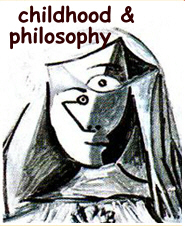acerca de la lógica en el programa de filosofía para niños
Palabras clave:
Lipman, Programa Filosofia para Crianças, lógica formal, lógica das boas razões, lógica do agir racionalResumen
El presente artículo tiene como objetivo presentar parte de los resultados de la investigación de Iniciación Científica llamada Fundamentos Lógicos de uma Educação para o Pensar. Específicamente, se exponen los contenidos lógicos desarrollados por Matthew Lipman en la novela filosófica A descoberta de Ari dos Telles. El texto está estructurado en tres secciones principales, a saber, Lógica formal, Lógica de las buenas razones e Lógica de actuar racional. En la primera de ellas, mapeamos los contenidos de la lógica formal presentes em la referida novela. En este sentido, estudiamos la lógica aristotélica de una forma progresiva, esto es, pasando de los elementos más simples a los más complejos: las proposiciones categóricas, la inversión de proposiciones categóricas, la estandarización, el cuadro de oposiciones, la lógica de relaciones y, finalmente, el silogismo aristotélico (y sus formas inválidas). Después de eso, todavía en la primera sección, tratamos de otros aspectos de la lógica formal trabajados en la perspectiva de Lipman. Son ellos: el silogismo hipotético, la inducción, la relación lógica entre parte y todo, las cuatro posibilidades y las tautologías. Con relación a la segunda sección, presentamos un abordaje de la lógica cuya denominación es lógica de las buenas razones. Por fin, en la tercera y última sección, intitulada Lógica del actuar racional, el énfasis está situado em el uso constante y cotidiano de la reflexión; en otras palabras, constatamos que la lógica del actuar racional tiene como meta el uso del pensamiento reflexivo con vistas a un comportamiento razonable. Palabras-clave: Lipman; Programa Filosofia para Niños; lógica formal; lógica de las buenas razones; lógica del actuar racionalDescargas
Los datos de descargas todavía no están disponibles.
Descargas
Publicado
2010-02-02
Número
Sección
artículos
Licencia
el copyright de cada artículo pertenece a cada autor. childhood & philosophy tiene el derecho a la primera publicación. el permiso de reimprimir cualquier artículo que haya aparecido en la revista necesita de la autorización escrita del autor. en adisión a cualquier forma de reconocimiento requerido por el autor el siguiente aviso debe ser añadido a la declaración de permiso en la reimpresión (con los números apropiados a los puntos suspensivos): [título del artículo] fue publicado originalmente en la infancia y la filosofía, tomo ..., número ..., pp. ...-...




